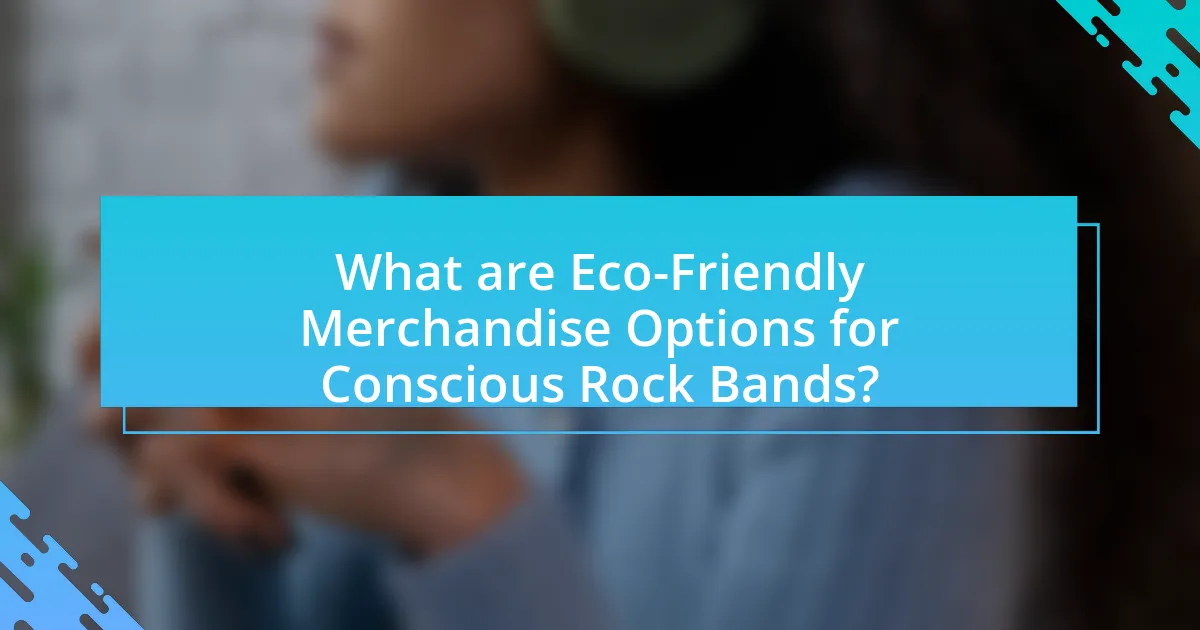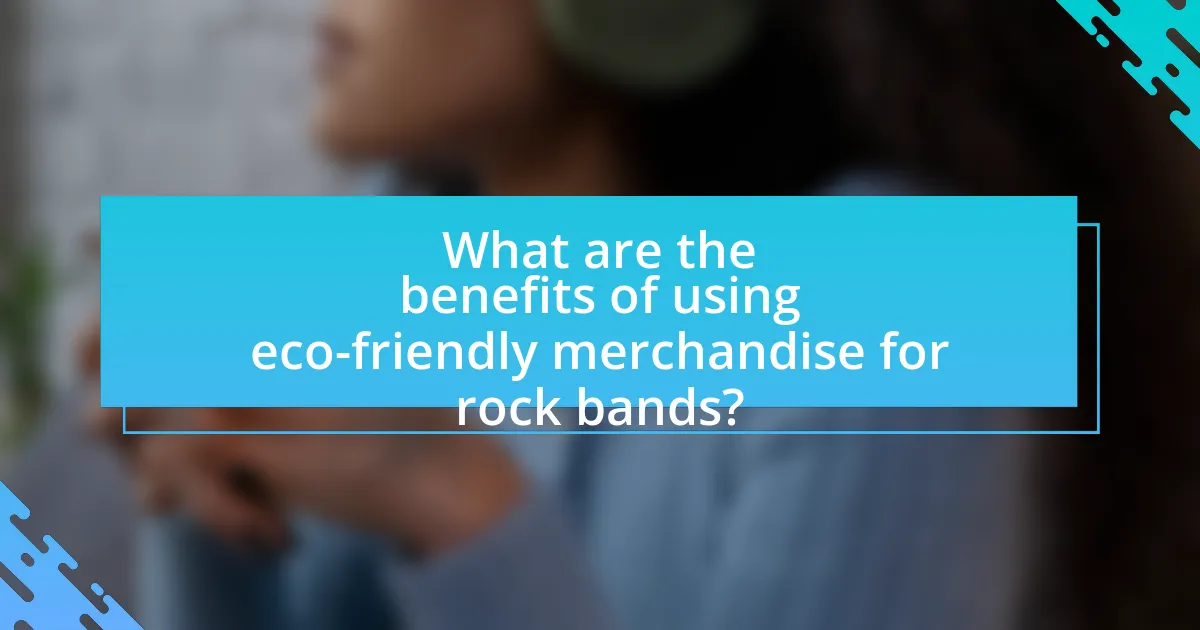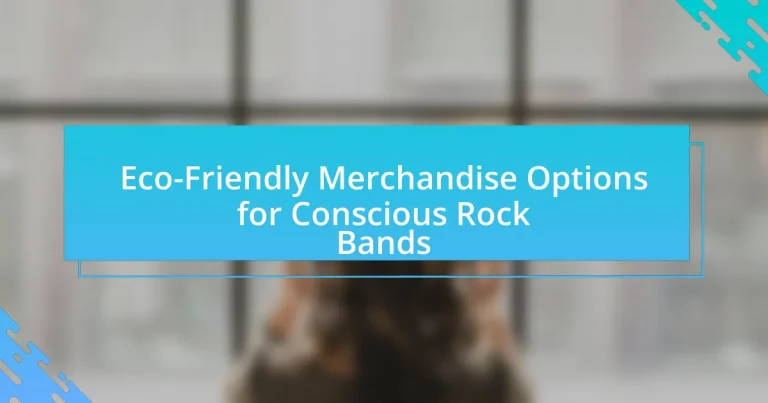Eco-friendly merchandise options for conscious rock bands include products made from organic cotton, recycled materials, and biodegradable substances, which significantly reduce environmental impact. The article explores the importance of sustainability in the music industry, highlighting how eco-friendly merchandise can enhance a band’s image, appeal to environmentally conscious fans, and foster community engagement. It also addresses the challenges bands face in sourcing sustainable products, common misconceptions about eco-friendly items, and effective marketing strategies to promote these initiatives. Additionally, the article outlines practical tips for implementing eco-friendly practices, emphasizing the long-term benefits for both the environment and brand loyalty.

What are Eco-Friendly Merchandise Options for Conscious Rock Bands?
Eco-friendly merchandise options for conscious rock bands include organic cotton t-shirts, recycled materials for posters and album covers, biodegradable phone cases, and sustainable accessories like bamboo sunglasses. These products reduce environmental impact by utilizing renewable resources and minimizing waste. For instance, organic cotton production uses 91% less water than conventional cotton, making it a sustainable choice for apparel. Additionally, using recycled materials can significantly lower carbon emissions associated with manufacturing new products.
Why should rock bands consider eco-friendly merchandise?
Rock bands should consider eco-friendly merchandise to reduce their environmental impact and appeal to a growing audience that values sustainability. The music industry contributes significantly to waste, with an estimated 1.5 billion plastic bottles used annually at concerts. By offering eco-friendly products, bands can minimize waste and promote a positive image, aligning with consumer preferences; a 2021 survey indicated that 73% of millennials are willing to pay more for sustainable products. This approach not only enhances brand loyalty but also supports global efforts to combat climate change.
What environmental impacts do traditional merchandise options have?
Traditional merchandise options, such as cotton t-shirts and plastic items, have significant environmental impacts, primarily due to resource consumption and waste generation. The production of cotton t-shirts requires large amounts of water, with estimates suggesting that it takes about 2,700 liters of water to produce a single cotton shirt, contributing to water scarcity in some regions. Additionally, plastic merchandise, often used for promotional items, contributes to pollution and landfill waste, as only about 9% of plastic is recycled globally, leading to long-lasting environmental harm. These factors highlight the unsustainable nature of traditional merchandise options, emphasizing the need for eco-friendly alternatives.
How can eco-friendly merchandise enhance a band’s image?
Eco-friendly merchandise can enhance a band’s image by aligning the band with sustainability and social responsibility, which resonates with environmentally conscious fans. This alignment not only attracts a dedicated audience but also fosters a positive reputation in the music industry. For instance, a 2021 study by the Nielsen Music Group found that 73% of millennials are willing to pay more for sustainable products, indicating a strong market for eco-friendly merchandise. By offering such products, bands can demonstrate their commitment to environmental issues, thereby strengthening their brand identity and loyalty among fans.
What types of eco-friendly merchandise are available for rock bands?
Eco-friendly merchandise available for rock bands includes items such as organic cotton t-shirts, recycled paper posters, biodegradable phone cases, and reusable water bottles. These products are designed to minimize environmental impact while promoting the band’s brand. For instance, organic cotton t-shirts reduce pesticide use and water consumption compared to conventional cotton. Recycled paper posters utilize materials that would otherwise contribute to waste, and biodegradable phone cases break down naturally, reducing plastic pollution. Reusable water bottles encourage fans to reduce single-use plastic waste, aligning with sustainable practices.
What materials are commonly used in eco-friendly merchandise?
Eco-friendly merchandise commonly utilizes materials such as organic cotton, recycled polyester, bamboo, hemp, and biodegradable plastics. Organic cotton is grown without synthetic pesticides or fertilizers, making it a sustainable choice for apparel. Recycled polyester, derived from post-consumer plastic bottles, reduces waste and conserves resources. Bamboo is a fast-growing plant that requires minimal water and no pesticides, making it an eco-friendly textile option. Hemp is known for its durability and low environmental impact, as it grows quickly and enriches the soil. Biodegradable plastics, made from natural materials like cornstarch, break down more easily in the environment compared to traditional plastics. These materials collectively contribute to reducing the ecological footprint of merchandise produced for conscious consumers.
How do different product categories (apparel, accessories, etc.) contribute to sustainability?
Different product categories, such as apparel and accessories, contribute to sustainability by utilizing eco-friendly materials, promoting ethical production practices, and encouraging responsible consumer behavior. Apparel made from organic cotton or recycled fabrics reduces environmental impact by minimizing pesticide use and waste. Accessories crafted from sustainable materials, like bamboo or reclaimed wood, further decrease resource depletion. Additionally, brands that prioritize fair labor practices and transparency in their supply chains foster a culture of sustainability. For instance, the Global Fashion Agenda reported that sustainable fashion could reduce greenhouse gas emissions by 30% by 2030 if widely adopted.
How can conscious rock bands source eco-friendly merchandise?
Conscious rock bands can source eco-friendly merchandise by partnering with suppliers that specialize in sustainable products, such as organic cotton apparel, recycled materials, and biodegradable items. These suppliers often provide certifications, like Global Organic Textile Standard (GOTS) or Fair Trade, ensuring that the merchandise meets environmental and ethical standards. For instance, companies like Eco-Products and Merchology offer a range of eco-friendly options tailored for bands, including reusable bags and sustainable clothing. By choosing these suppliers, bands can reduce their environmental impact while promoting their values through their merchandise.
What certifications should bands look for in eco-friendly products?
Bands should look for certifications such as Global Organic Textile Standard (GOTS), OEKO-TEX Standard 100, and Fair Trade Certified when selecting eco-friendly products. GOTS ensures that textiles are made from organic fibers and meet environmental and social criteria throughout the production process. OEKO-TEX Standard 100 certifies that textiles are free from harmful substances, promoting safety for consumers and the environment. Fair Trade Certified guarantees that products are made under fair labor conditions, supporting sustainable practices and ethical sourcing. These certifications provide assurance that the products align with eco-friendly and ethical standards.
How can bands evaluate suppliers for sustainability practices?
Bands can evaluate suppliers for sustainability practices by assessing their environmental certifications, supply chain transparency, and adherence to sustainable sourcing standards. For instance, suppliers with certifications such as ISO 14001 or Fair Trade demonstrate a commitment to environmental management and ethical practices. Additionally, bands should request detailed information about the supplier’s sourcing methods, including the use of recycled materials and energy-efficient production processes. Research indicates that companies with transparent supply chains are more likely to engage in sustainable practices, as highlighted in the 2021 report by the World Economic Forum, which emphasizes the importance of accountability in sustainability efforts.

What are the benefits of using eco-friendly merchandise for rock bands?
Using eco-friendly merchandise benefits rock bands by enhancing their brand image and appealing to environmentally conscious fans. This approach not only demonstrates a commitment to sustainability but also differentiates the band in a competitive market. Research indicates that 66% of consumers are willing to pay more for sustainable brands, highlighting the potential for increased sales and loyalty. Additionally, eco-friendly products often utilize sustainable materials, reducing environmental impact and promoting a positive message about climate responsibility. This alignment with fans’ values can lead to stronger community engagement and support for the band’s initiatives.
How does eco-friendly merchandise impact fan engagement?
Eco-friendly merchandise significantly enhances fan engagement by aligning brand values with the growing consumer demand for sustainability. Fans are increasingly motivated to support brands that demonstrate environmental responsibility, leading to stronger emotional connections and loyalty. A study by the Nielsen Global Sustainability Report found that 66% of consumers are willing to pay more for sustainable brands, indicating that eco-friendly products can drive purchasing decisions and foster a sense of community among fans who share similar values. This alignment not only boosts sales but also encourages fans to actively participate in promoting the brand, thereby increasing overall engagement.
What are the potential sales benefits of offering sustainable products?
Offering sustainable products can significantly enhance sales by attracting environmentally conscious consumers. Research indicates that 66% of global consumers are willing to pay more for sustainable brands, demonstrating a strong market demand. Additionally, sustainable products often lead to increased brand loyalty, as customers are more likely to support companies that align with their values. This loyalty can translate into repeat purchases and positive word-of-mouth, further boosting sales. Furthermore, companies that adopt sustainable practices may benefit from reduced operational costs over time, as energy-efficient processes and materials can lower expenses. Overall, the integration of sustainable products into a brand’s offerings can create a competitive advantage and drive revenue growth.
How can eco-friendly merchandise foster a community around the band?
Eco-friendly merchandise can foster a community around the band by aligning the band’s values with those of environmentally conscious fans. This alignment encourages fans to engage more deeply with the band, as they feel a shared commitment to sustainability. For instance, when a band offers products made from recycled materials or organic fabrics, it not only attracts eco-conscious consumers but also creates a sense of belonging among fans who prioritize environmental issues. Research shows that brands with sustainable practices can enhance customer loyalty, as seen in a 2021 study by Nielsen, which found that 73% of millennials are willing to pay more for sustainable products. This shared commitment to eco-friendliness can lead to increased interaction among fans, such as discussions on social media, participation in eco-friendly events, and a stronger overall community identity centered around both the band and environmental stewardship.
What are the long-term advantages of adopting eco-friendly practices?
Adopting eco-friendly practices offers long-term advantages such as reduced environmental impact, cost savings, and enhanced brand reputation. By minimizing waste and lowering carbon emissions, businesses contribute to a healthier planet, which is increasingly important to consumers. For instance, a study by the Carbon Trust found that companies implementing sustainable practices can reduce operational costs by up to 20% through energy efficiency and waste reduction. Additionally, brands that prioritize sustainability often experience increased customer loyalty, as 66% of global consumers are willing to pay more for sustainable goods, according to Nielsen. This shift not only fosters a positive public image but also aligns with the growing demand for environmentally responsible products.
How can sustainability initiatives lead to brand loyalty?
Sustainability initiatives can lead to brand loyalty by aligning a brand’s values with those of environmentally conscious consumers. When brands implement eco-friendly practices, such as using sustainable materials or reducing carbon footprints, they attract customers who prioritize environmental responsibility. Research indicates that 66% of consumers are willing to pay more for sustainable brands, demonstrating a direct correlation between sustainability efforts and consumer loyalty. Additionally, brands that communicate their sustainability initiatives effectively can enhance their reputation, fostering trust and emotional connections with customers, which further solidifies brand loyalty.
What role does eco-friendliness play in the future of the music industry?
Eco-friendliness will play a crucial role in the future of the music industry by driving sustainable practices and consumer preferences. As awareness of environmental issues increases, artists and music companies are adopting eco-friendly merchandise, such as biodegradable materials and sustainable sourcing, to align with the values of their audience. For instance, a 2021 report by the International Music Summit highlighted that 70% of music fans prefer to support artists who prioritize sustainability. This shift not only enhances brand loyalty but also encourages the entire industry to reduce its carbon footprint, making eco-friendliness a key factor in shaping future business models and marketing strategies.

What challenges do rock bands face when implementing eco-friendly merchandise?
Rock bands face several challenges when implementing eco-friendly merchandise, primarily related to cost, supply chain logistics, and consumer demand. The production of sustainable products often incurs higher costs due to the use of organic materials and ethical manufacturing processes, which can lead to increased retail prices that may deter fans. Additionally, sourcing eco-friendly materials can complicate supply chains, as not all suppliers offer sustainable options, potentially leading to delays or limited product availability. Furthermore, consumer awareness and demand for eco-friendly merchandise can vary, making it difficult for bands to predict sales and justify the investment in sustainable products. These factors collectively hinder the widespread adoption of eco-friendly merchandise in the rock music industry.
What are the common misconceptions about eco-friendly products?
Common misconceptions about eco-friendly products include the belief that they are always more expensive, less effective, and less accessible than conventional alternatives. Many consumers assume that eco-friendly products, such as biodegradable packaging or organic materials, come with a higher price tag due to perceived production costs. However, studies show that as demand increases, prices for eco-friendly options can become competitive with traditional products. Additionally, some people think that eco-friendly products do not perform as well as their non-eco counterparts; research indicates that many eco-friendly cleaning products, for example, are just as effective as chemical-based ones. Lastly, there is a misconception that eco-friendly products are not widely available, but many mainstream retailers now offer a variety of sustainable options, making them more accessible than ever.
How can bands overcome the perceived higher costs of sustainable merchandise?
Bands can overcome the perceived higher costs of sustainable merchandise by emphasizing the long-term value and brand loyalty associated with eco-friendly products. By educating fans on the environmental impact of their purchases, bands can create a narrative that aligns with their values, encouraging consumers to invest in sustainable options. Research indicates that 66% of global consumers are willing to pay more for sustainable brands, demonstrating a market readiness for eco-friendly merchandise. Additionally, bands can collaborate with sustainable manufacturers to reduce costs through bulk purchasing or co-branding initiatives, ultimately making sustainable merchandise more accessible and appealing to their audience.
What logistical challenges might arise when sourcing eco-friendly options?
Sourcing eco-friendly options presents logistical challenges such as limited availability of sustainable materials, higher costs, and complex supply chains. The limited availability often results from fewer suppliers producing eco-friendly products, which can lead to delays in procurement. Higher costs are frequently associated with sustainable materials due to their production processes and sourcing practices, impacting overall budget considerations. Additionally, complex supply chains arise as eco-friendly options may require sourcing from multiple vendors, increasing the risk of disruptions and complicating inventory management. These challenges necessitate careful planning and coordination to ensure timely delivery and cost-effectiveness in the procurement of eco-friendly merchandise.
How can bands effectively communicate their eco-friendly initiatives to fans?
Bands can effectively communicate their eco-friendly initiatives to fans by utilizing social media platforms, engaging in direct conversations during live performances, and incorporating sustainability messaging into their merchandise. Social media allows bands to share updates, behind-the-scenes content, and educational posts about their eco-friendly practices, reaching a wide audience quickly. For instance, bands can use Instagram stories or Twitter threads to highlight their use of sustainable materials or their partnerships with environmental organizations. Engaging fans during concerts by discussing their initiatives fosters a personal connection and encourages fans to participate in eco-friendly practices. Additionally, integrating sustainability messaging into merchandise, such as using recycled materials or promoting eco-friendly products, reinforces the band’s commitment to environmental responsibility and provides fans with tangible ways to support these initiatives.
What marketing strategies work best for promoting sustainable merchandise?
Effective marketing strategies for promoting sustainable merchandise include leveraging social media campaigns, collaborating with eco-conscious influencers, and emphasizing transparency in sourcing and production processes. Social media platforms allow brands to reach targeted audiences interested in sustainability, with studies showing that 79% of consumers are more likely to purchase from brands that demonstrate a commitment to environmental responsibility. Collaborating with influencers who advocate for sustainable practices can enhance credibility and expand reach, as their followers often trust their recommendations. Additionally, providing clear information about the sustainable materials and ethical practices used in the merchandise fosters trust and encourages consumer loyalty, as 66% of global consumers are willing to pay more for sustainable brands.
How can storytelling enhance the appeal of eco-friendly products?
Storytelling enhances the appeal of eco-friendly products by creating emotional connections between consumers and the brand. When brands share narratives about their sustainable practices, such as sourcing materials responsibly or supporting local communities, they foster a sense of authenticity and trust. For instance, a study by the Harvard Business Review found that consumers are more likely to purchase products that resonate with their values, particularly when those products have a compelling story behind them. This connection not only differentiates eco-friendly products in a crowded market but also encourages consumer loyalty and advocacy, as individuals feel part of a larger mission for environmental sustainability.
What practical tips can rock bands follow to successfully implement eco-friendly merchandise?
Rock bands can successfully implement eco-friendly merchandise by sourcing sustainable materials, such as organic cotton or recycled fabrics, for their apparel. This approach reduces environmental impact and appeals to eco-conscious fans. Additionally, bands should consider using biodegradable packaging to minimize waste and promote recycling initiatives at their events. Research indicates that 66% of consumers are willing to pay more for sustainable brands, highlighting the market potential for eco-friendly merchandise. Collaborating with local artisans for unique, sustainable products can also enhance community engagement and support local economies.

















